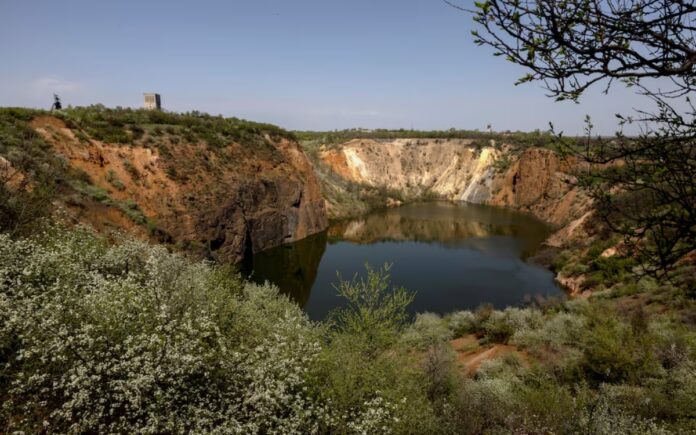Zhovti Vody: As discussions between Kyiv and Washington progress over a deal that would provide the U.S. with a share of Ukraine’s mineral resources, Ukrainians from the country’s mining regions are sending a clear message to President Donald Trump: don’t take advantage of us; these resources are ours.
The U.S. president has pressured Ukraine, threatening to halt military aid unless the U.S. receives compensation for the billions of dollars spent on assisting Ukraine in its fight against Russia’s invasion. However, the deal has stirred sensitivity in Ukraine, particularly in regions rich in coal, iron ore, and other increasingly valuable minerals, including rare earth elements. These mineral resources play a significant role in Ukraine’s economy, with revenue from these industries being a crucial part of the state budget.
In Kryvyi Rih, a city known for its vast open-cast iron ore mines, 71-year-old pensioner Oleksandr expressed skepticism about Trump’s intentions. “You can’t trust that ginger guy, he’s not that kind of person,” he said while shopping near the UGOK iron ore mining and processing plant. He added, “From what I can see, they only want to take, not to give.”
As the US and Ukraine hammer out a mineral deal, Ukrainians from the mining heartlands have a message for Washington — the resources are theirs https://t.co/xf5j5EP8Ft pic.twitter.com/7PWfJOnff0
— Reuters (@Reuters) April 30, 2025
Kryvyi Rih, the hometown of President Volodymyr Zelenskiy, has long been a hub for Ukraine’s mining sector. Zelenskiy, while negotiating a deal to create a mineral revenue fund that would provide the U.S. with access to Ukrainian mineral wealth, acknowledged the sensitivity of the situation. On Monday, he commented that discussions had made progress since the memorandum of intent signed on April 18, stating:
“The document has become much stronger – more equitable – and could be beneficial to both our peoples, for Ukraine and for America.”
Zelenskiy understands that he needs to gain Trump’s approval to secure the deal, but also recognizes the potential backlash from the Ukrainian public if the terms are unfavorable. About 60 kilometers (40 miles) north of Kryvyi Rih, in Zhovti Vody, a town historically known for its uranium and iron ore mining, local residents like 71-year-old Nina Fesenko expressed concern over the deal’s implications.
“I hope that the people who are involved in this think about Ukraine and its people, because our mineral riches belong to the people,” Fesenko said.
Also Read | Pentagon Chief Ends Trump-Era Women, Peace, and Security Program, Calling It ‘Woke’ Distraction
Olga Marynska, 68, echoed these sentiments, hoping the government would ensure Ukraine was not exploited.
“We don’t have to give them everything,” she said. “I don’t think we have to do it in such a way that they take everything out of that fund.”
Ukrainian Prime Minister Denys Shmyhal addressed the concerns on Sunday, stating that there was now agreement that the deal would not be used to cover the costs of U.S. aid previously provided to Kyiv. This clarification may help assuage fears among Ukrainians, many of whom feel they have been fighting Russia not only for their own survival but also on behalf of the West—particularly the U.S.-led NATO alliance and European nations.
Also Read | Indian Army Jawan in West Bengal Receives Death Threat Over ‘Saving Hindus’
“I do think that for us as Ukrainians, it feels a little bit like another country is using our vulnerability, which was not created by us,” said Inna Sovsun, a Ukrainian legislator. She emphasized the importance of considering the long-term impact of any deal, adding, “It is critically important when we are designing the future to keep in mind that people will live here in the future.”



